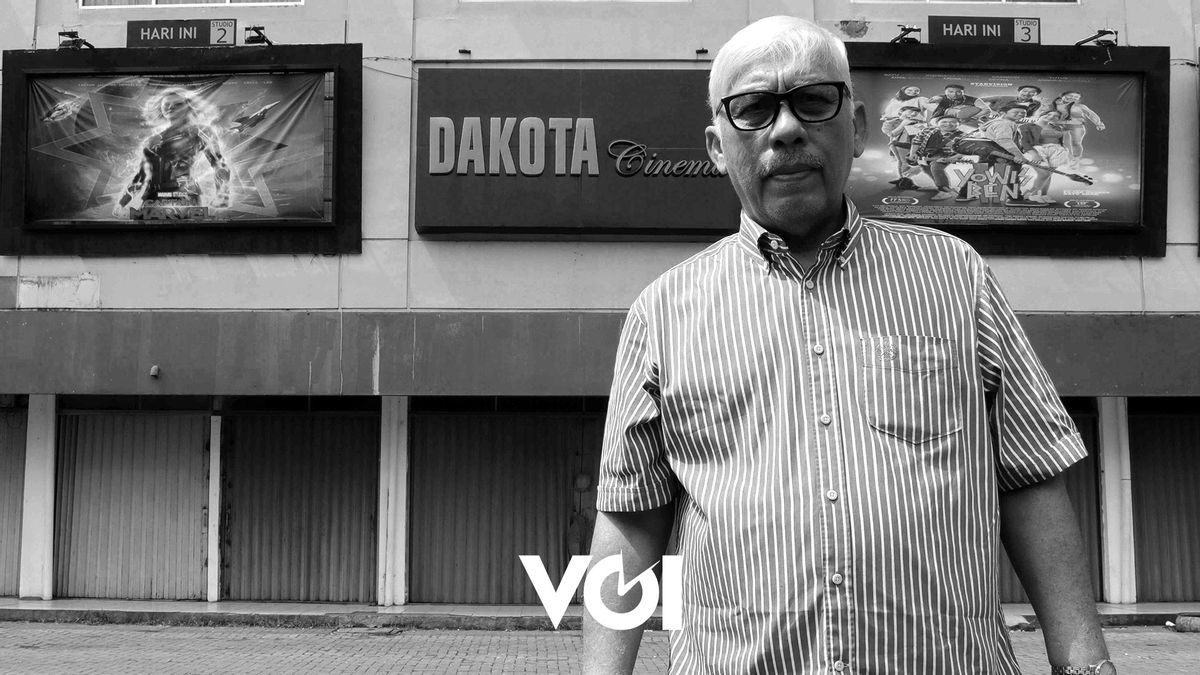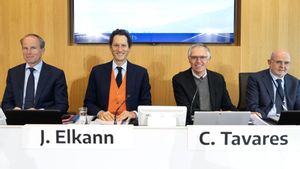
Almost all business fields were affected during the COVID-19 pandemic. The cinema entrepreneur is no exception. As chairman of the Association of Indonesian Cinema Entrepreneurs (GBPSI), Djonny Sjafruddin asserted that if the cinemas were not assisted, they could permanently close. Countless how many members have complained about the severity of the current situation. This situation is further complicated by the various obligations they have to pay ranging from taxes, operations and other expenses. This is his vent to the VOI team.
***
The COVID-19 pandemic has forced the government to impose restrictions in various sectors. Movement and crowds of people are restricted to minimize the spread of the virus. Cinemas as a place to gather and show films are also experiencing restrictions. After being completely closed at the beginning of the pandemic, cinemas are slowly starting to open with strict health protocols and limiting the number of viewers.
However, along with increasing the number of corona cases in Indonesia, the government has again tightened the movement of people in the Micro PPKM (Enforcement of Community Activity Restrictions) scheme, then Emergency PPKM and finally PPKM Level 4, making cinemas closed again. According to Djonny, this closure caused significant losses. "The loss figures for each cinema are not the same, some are Rp. 50 million, Rp. 70 million and some are even Rp. 150 million per month. The biggest is the burden of electricity and employee salaries," he said.
According to data from filmindonesia.or.id throughout 2020, the growth of cinema screens in Indonesia was observed to slow down. The number of screens only rose 1.7% to 2,145 screens and cinemas increased by 1.8% to 517 cinemas. During this pandemic, most of them were affected because cinema activities were very limited. “How do you want to get viewers, the pandemic situation that limits everything. My cinema is also experiencing the same thing,” complained Djonny, who is also the owner of the Dakota Cinema cinema network which operates in Cilacap and Kroya, Central Java, Rancaekek West Java and Sengkang, South Sulawesi.
From the facts, it is clear that the national film industry, in this case the cinema sector, has been affected by the COVID-19 pandemic. That's why Djonny asked the government to pay attention to cinema entrepreneurs who are members of GBPSI. “Obviously we are very affected by the COVID-19 pandemic, but we have not received the slightest attention from the government. Therefore, we ask the government to provide relaxation in the form of relief from electricity payments, tax breaks and also wage subsidies for employees," said Djonny Sjafruddin to Iqbal Irsyad and Edy Suherli from VOI who interviewed him virtually recently. Here is the full interview excerpt.

In this pandemic era, one of the sectors affected is cinema. After closing, it was only allowed to accept partial viewers and is now completely closed. What is your response as a cinema entrepreneur?
Before answering this question, let me first explain how the history of the presence of cinemas, especially those in Indonesia. So so that people who read or watch this interview can have a complete picture of cinema and cinema entrepreneurs. Especially what they are experiencing during this COVID-19 pandemic. It's because someone said that cinema entrepreneurs need assistance? Frankly, I'm sad to hear people commenting like that.
Cinema was first present in Indonesia in Tanah Abang around the 1900s. So the presence of the cinema has been around for 120 years in Indonesia. In the post-independence period, the government imposed high taxes on cinemas because they were categorized as luxury goods. The amount of the tax is 33 percent. Until the 1980s the cinema tax was still 33 percent.
The cinema sector has been around since the Dutch era until post-independence and is now contributing to local revenue throughout Indonesia. In the 1990s, lower-middle class cinemas closed. What was left was only 40 percent for high-end cinemas, which at that time were majority controlled by group 21.
Why did it close?
One of the reasons is the advancement of technology. At that time RCTI as one of the first private television stations presented good films on television. At first RCTI used a decoder, but over time it became a television like today that can be captured even without additional tools such as a decoder. The films that are presented are of good technology. This is the reason why the lower middle class cinemas are closed. Many people watch at home. Meanwhile, the quality of the films shown in medium-sized theaters has decreased. The more the film sells, the more scratched the film is, the faster it will break up because it is played over and over again.
Cinema began to rise again in 2004 when digital technology penetrated the world of cinema. At that time, cinema was slowly re-emerging until now in the period before the pandemic broke out.

Okay, back to the original topic regarding the COVID-19 pandemic, what are the real conditions experienced by cinema entrepreneurs?
This pandemic occurred in early March 2020, we cinema entrepreneurs under GBPSI were asked to close their business. All that we do with obedience. Then the cinema was allowed to open and then told to close again. When the corona case was getting higher and the government implemented Emergency PPKM, then followed by PPKM Level 4, cinemas were completely closed. If I can compare this cinema entrepreneur with other business fields, I would say the most obedient.
The cinema entrepreneur is not fussy, we are mostly silent even though the situation is getting tighter. Being obedient and not fussy like this, the government is paying very little attention to us. We ask to be treated fairly. It means that all sectors please pay attention, including us who are cinema entrepreneurs. Our request is not grandiose, because we also know that the government is currently overwhelmed with this pandemic, the money spent is trillions.
The Ministry of Tourism has asked us for data but the system is too complicated. Playing around ended up wasting time and help failed. Mr. Sandiaga Uno hopefully can listen to our complaints.
Now there is another Emergency PPKM, followed by PPKM Level 4, what kind of condition are entrepreneurs in, getting worse?
Since the implementation of the Emergency PPKM throughout Java and Bali, we have closed all cinemas in the area. Until it is continued with PPKM Level 4, the closure is still continuing. Even though it is closed for maintenance, our staff will continue to do it regularly. All of that costs money, while there is absolutely no income. This is the biggest problem experienced by cinema entrepreneurs. Operational costs remain while income does not exist. But even though they are forced to open for now, the problem is still there, the film that wants to be shown is not there. Before the pandemic, filmmakers were scrambling for screens to show their films. There should be tolerance, you lose, we also lose. What we have to take care of is that this cinema is permanently closed.
Films from abroad, especially from America, had re-entered after the opening of theaters partially. But now with the implementation of this Emergency PPKM, American films have not released their films at all in cinemas in Indonesia.
So things are getting tougher now?
Yes, that's the situation, cinemas were ordered to close because of Emergency PPKM which was followed by PPKM Level 4. If cinemas were allowed to open, they couldn't do much, because there weren't any films that wanted to be shown.
What steps are taken by cinema entrepreneurs?
Inevitably laying off employees, then we take turns to apply. Even though the condition is like that, the salary still has to be paid. There are also employees who are not strong enough to leave and look for other jobs, if someone leaves then we can't stop them. The situation is really difficult right now. There are more than 10,000 cinema employees throughout Indonesia.
Then what do you exclaim with such a great crush?
What we expect from the government is not much, various sectors have received relief and relaxation. We also hope so, because we are also affected. We hope that the government can implement policies that are more in our favor. Such attention and assistance, for example, can be provided with incentives from either the central or local governments, for relief in electricity payments. The problem is that electricity is the biggest component that cinema entrepreneurs have to take care of in addition to the post for employee salaries.
The next relief we expect from the tax side. During this pandemic we really hope to get this entertainment tax relief. After normal conditions can be treated again as before. For cinema employees, we hope that the government can provide it, because during this pandemic they do not receive their full salary. And what we most ask for is firmness from the government about when these cinemas may reopen.
For cinema taxes, it's not the same in each region, there is a maximum and there is a minimum, what are your expectations about this?
This has actually been a concern for us for a long time, the entertainment or spectacle tax is excluded from luxury goods. Cinema should not be confused with taxes on other entertainment venues such as nightclubs, massage parlors, billiards and so on. Because this cinema has a mission to raise the dignity of the nation's culture through film.
Currently, the amount of tax for the cinema varies from region to region, there are 30, 25, 20, 15 and 10 percent. DKI Jakarta happens to be 10 percent. This should be uniform for all of Indonesia, the amount is 10 percent such as VAT, from Sabang to Merauke. Why is that because the mandate of the law is not clear. Entertainment tax as high as 35 percent. It should be the same for all parts of Indonesia. My suggestion is that this can be changed and uniformed.
Can you guarantee the proces takes place in theaters if they open?
So far, we have been very obedient to the prokes. However, if it is necessary, air samples can be tested in the cinema room before the screening and after the screening, and so on. So to the parties not to give opinions that are not conducive. Our struggle right now is not to let this cinema close permanently. The problem is that if the cinema is permanently closed, everything will be finished.
The issue of distribution of foreign films and local films is still a constant discussion, foreign films are accused of being packaged compared to national films, how do you react to this?
The film importers studied the demographics and conditions of the area. This must be learned. About the circulation of foreign films. Indeed, we should side with the works of the nation's children, Indonesian producers, as mandated by the Law, 60 percent of national films and 40 percent of imported films. But cinemas also have a minimum number to show a film. If you play once, the audience is only 2 people, the period will continue. This is a business, cinema entrepreneurs can go bankrupt if they are forced to continue showing films that have no audience. We can help at least one third of the audience capacity. If it's less than that, it's heavy. So before making this film, the suggestion for all producers should be to survey first, make a film that is liked and has potential audiences.
Regional and local themed films such as those made by Makassar filmmakers deserve to be examples. The films they make can beat Hollywood films when screened in that area. This is amazing. What does it mean, if people are presented with what they like and are close to their culture, they will be welcomed. Publication is also very important that producers must pay attention to, with good publications there will be an impact.
What about the development of technology 4.0 and the presence of OTT (over the top) and movies via the internet?
The development of the times is like that, nor can we fight against things like that. The only thing that needs to be underlined is that there is something that moviegoers cannot find at home, on cellphones or in any medium other than cinema. In terms of sound quality, picture and atmosphere, it's very different. The satisfaction of watching a movie is incomparable to that of the cinema. Not to mention that the cinema can be a means of communication and socialization. The cinema is still irreplaceable in my opinion.
Keep Organizing Until Almost All of Djonny Sjafruddin's Hair Turns White

From a young age, this Minangkabau-blooded man has been fond of organizing. Since the golden era of US (Indonesian Student Action Union) and KAPI (Indonesian Student Action Union) in the 1960s, Djonny Sjafruddin has been actively organizing. As a student he became a member of KAPI at that time. He is also involved in RW level organizations to the national level, from religious organizations to professional organizations. He even had time to join a political party though not for long. Until now, when almost all the hair on his head had turned white, he still kept organized.
Why should you organize? For the man who was born in Pekanbaru, July 4, 1948, it is through organization that many things can be realized more easily and faster. Yes, like the broom stick philosophy, he will have tremendous power when he has become a broom consisting of tens or even hundreds of sticks. At that time the new broom sticks had the power to do something. “The essence of the organization for me must be useful for many people. I'm so happy to organize, I often forget about myself. If that's the case, it's my family who like to complain," he said.
Not once or twice did he have to be reminded by his wife and children. "Well, it can't be helped when we are busy taking care of something, sometimes we forget about others. Fortunately, my family doesn't get tired of reminding me," continued the husband of Sri Utami. From his marriage to Sri, Djonny was blessed with a daughter whom he named; Triselly Devi.
In the neighborhood where he is domiciled, Billy and Moon Housing Pondok Kelapa, Duren Sawit, East Jakarta, Djonny was lined up to be the Chairman of the RW (Rukun Warga). Unmitigated about 20 years he held that position. As usual for other housing residents, when someone is considered capable of carrying out their duties as Chair of an RT or RW, they are always supported to become chairman and continue for several periods. "After completing one period, we are asked to continue and continue again," said the former chairman of the National Film Advisory Agency (BP2N).
Djonny did not waste his position. When he was the head of the RW, he carried out various physical programs such as the construction of tennis courts, volleyball courts, construction of RW offices, security officers' offices, road facilities and infrastructure, lighting and so on. If it's like this, it's only natural that residents ask him to continue and continue again. "Because the mandate that was given to me, I took good care of it. And in my leadership, the results of the construction are visible. The funds collected by the residents go to facilities that can be used by all residents,” said Djonny, who likes tennis. However, due to the current COVID-19 pandemic, he stopped the sport and replaced it with an individual and independent sport.

Religious
Still in the neighborhood where you live. Djonny Sjafruddin also holds the position of Chairman of the Baitussalam Waqf Foundation, under which there is the Baitussalam Mosque, in the Billy and Moon housing estate. “In my housing complex there is already a mosque. But because he was old his condition was pathetic. At that time a meeting of the mosque management was held, there were two options to be carried out, renovated or completely demolished. I propose a complete dismantling. After a long debate, they finally agreed to completely dismantle it,” recalls Djonny.
Because he had agreed to demolish it, Djonny did not want to do anything and nothing in building the house of worship. He invited a famous architecture from Bandung to design a mosque in his housing. Baitussalam Mosque is made magnificent and large, with a projection of a long service life. Because of that he completes good facilities and infrastructure and in terms of price it is not cheap. “For loudspeakers only, I chose American made which cost hundreds of dollars. There were those who were against it. But I explain that this is good and the service life is also long. Thankfully, there are our residents who are kind enough to buy them even though they are very expensive,” he said.
Yang also received no less fierce opposition when he proposed an elevator for the mosque in his complex. “I explained at that time, now ladies and gentlemen do not use this elevator but one day when they are old or have other limitations, it will be useful. It turned out to be true, now many elderly people are using it. Thank God I still haven't used it," he said with a burst of laughter.
His next plan is to find land to buy and build Islamic educational institutions such as pesantren. “Please pray, we are still looking for land around Bogor to build a boarding school. Through educational institutions like this we hope to be a place of learning for the young generation of the nation's hope. At the same time, this place can be a symbol for Islam. Hopefully, in the not too distant future, the idea can be realized, although it will be carried out in stages, “said the Head of the Film Center Foundation, H. Usmar Ismail (PPHUI).

Profession
The professional organization that catapulted Djonny's name the most was his work as a cinema entrepreneur. Because of his ownership in the cinema, the owner of the Dakota Cinema Cinema business was lined up to become the Chair of the All Indonesian Cinema Entrepreneurs Association (GBPSI). Like taking the lead as Chair of the RW in his residential area, the duration of his leadership was quite long at GPBSI. "Yes, it has been more than 20 years that I have been the Chair of this GPBSI," he admitted.
By the way, is there no succession or next generation in the GPBSI environment so that you are again and again occupying the position of chairman? “It's not that I don't want to be replaced, I really want to be replaced and this task can be continued to those who are younger. But who wants, who wants If you want, you don't have to wait long for the next organizational congress to be ready,” he said challenging who would replace him.
He had already stated that he would resign if he felt he had been in charge for too long. "I've already said I'm going to retire. But yes, hold and support again and be supported again,” he said, mentioning that one of the largest cinema business groups still expects him to lead. “The consequence is that there is no regeneration in the body of GPBSI. I really hope that someone will become the chairman,” continued the grandfather of Lulu Hiawata and Hiamovi Dakota.
Now the cinema business, like other business sectors, has also been affected by the COVID-19 pandemic. As the Chairman of GBPSI, he often hears the complaints and complaints of its members. "During this pandemic, cinemas are places that are completely closed by the government. It had been open for a while with a limited number of spectators, but now it's closed again. We do not know when the cinema entrepreneur can operate his place of business again. We hope that the situation will improve,” said Djonny Sjafruddin.
“The development of the times is like that, we also can't fight things like that. The only thing that needs to be underlined is something that moviegoers don't find at home, on cellphones or in any medium other than cinema. In terms of sound quality, picture and atmosphere, it's very different. The satisfaction of watching a movie is incomparable to that of the cinema. Not to mention that the cinema can be a means of communication and socialization. The cinema is still irreplaceable in my opinion.”
Djonny Sjafruddin
The English, Chinese, Japanese, Arabic, and French versions are automatically generated by the AI. So there may still be inaccuracies in translating, please always see Indonesian as our main language. (system supported by DigitalSiber.id)










